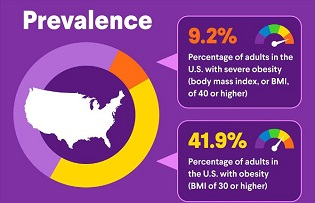BACK
How to Talk to Your Health Care Professional
How to Talk to Your Health Care Professional (HCP)
When you're ready, consider talking with a health care professional about your weight. Why? Because a skilled, compassionate health care professional can support you on your journey by:
- Helping you set realistic goals
- Teaching you about meal planning and exercise
- Identifying behavioral counseling needs
- Answering questions about weight-related health issues you may face
- Advising you on whether to consider medical or surgical treatments
Don't assume that your health care professional will ask you about your weight during a checkup. Only about one-quarter of physician office visits made by adults with obesity include counseling or education about weight reduction, according to Healthy People 2030.
Fortunately, you don't have to wait for your health care professional to start a conversation with you about obesity. You can bring it up at your next checkup. Or you can schedule an appointment to address it, just as you would for any other health issue.
Click here to find endocrine care near you.
Talking With Your Health Care Professional About Your Weight
If you feel embarrassed about bringing up your weight with your health care professional, don't worry — that's normal. Our society has conditioned us to think about excess weight as a personal failure. But obesity is a disease and nothing to be ashamed about. It's your health care professional’s job to help you with it.
When talking with your health care professional about obesity, they may ask about things like:
- Your medical history
- Your weight history, including past experiences with programs and treatment
- Any history of disordered eating, such as binge eating or refusing to eat
- Your weight management goals
- Your concerns about weight-related medical conditions
- How your weight affects you physically, emotionally, socially, and professionally
- Your exercise and eating habits
- Your biggest weight management challenges
- Conditions that may impact your ability to exercise
- Medications and dietary supplements you take
- Your family health history, including details on family members' obesity and weight-related medical conditions
Before your appointment, be sure to think of some questions you'd like to cover with your health care professional. (This list is a good starting point.) Feel free to have a relative or friend come with you for support.
After talking with you about your weight and health, your health care professional will work with you to make a plan of action. The plan may include recommendations on healthy eating, exercise, behavioral counseling, prescription medication, and/or obesity surgery. It may also include referrals to other types of health care professionals.
Addressing Weight-Related Stigma and Bias
As someone who lives with obesity, you're probably well aware of anti-obesity biases (negative and unfair beliefs) and stigmas (unjust treatment based on negative beliefs). Unfortunately, these feelings and actions exist in all types of people — including some health care professionals.
"Negative attitudes about individuals with excess weight have been reported by physicians, nurses, dietitians, psychologists and medical students," states the Obesity Action Coalition, an obesity education and advocacy organization.
How can you tell if your health care professional may carry biases because of your weight? The best way to find out is to talk with them.
- Do they speak to you in a respectful, nonjudgmental way?
- Do they discuss obesity as a medical condition rather than a self-control issue?
- Do they encourage you to ask questions?
- Are they knowledgeable about obesity, weight management, and obesity treatments?
- Do they note how your personal life circumstances may have contributed to your obesity?
- Do you feel comfortable opening up to them?
- Do you feel listened to and respected?
- Do you feel safe and supported?
If you don't feel good about your health care professional's responses, you should share your concerns. Challenging a negative attitude about obesity is an important form of self-advocacy. It may also inspire your health care professional to rethink their hurtful views on obesity. Or you may decide to see a different health care professional.
Internalized Weight Bias: When the Bias Comes From You
Negative attitudes about obesity don't just come from others. They can also come from you; that's known as internalized weight bias (IWB).
How do you know if IWB is affecting how you think about yourself and your weight? Start by listening to what you say to yourself about your situation. For example, people with IWB may believe or even say things like:
- I'm ugly because I'm fat.
- Nobody will ever love me because I have obesity.
- I won't be happy unless I lose weight.
- Having obesity makes me worthless.
- I'm fat because I'm lazy and lack self-control.
- I'll never be able to lose weight.
- I deserve to be treated poorly because I have obesity.
Living with IWB can:
- Have a harmful effect on your emotions and self-confidence. It can also raise your risk of disordered eating, depression, anxiety, and other mental health conditions.
- Affect your actions. For instance, if you think you don't deserve happiness because you have excess weight, you may hold back on things like dating, going out with friends, or seeking promotions at work. What's more, you may not stand up for yourself if you're bullied for your weight because you may feel that you deserve it.
- Interfere with your efforts to lose weight and improve your health. Research has found that people with IWB may be less likely to see a health care professional for obesity treatment or to follow their treatment plan. IWB can hold you back from committing to eating and exercise changes.
IWB is very common. In fact, one study found that it affected over half of people with obesity.
Fortunately, you have the power to change self-biased thinking. Noticing your negative thoughts is a great first step, because it begins to give you a sense of control over them. Another key step is to talk with your health care professional. They may ask you to fill out a screening questionnaire that helps identify and measure IWB.
Once you and your health care professional start to understand the impact of IWB, you can work together to create a plan for addressing it. This plan may include journaling, asking loved ones for support, connecting with others who have obesity, joining a support group, and/or seeing a therapist.
Working to change self-biased thinking isn't easy. But it can have important benefits for your emotional health, physical health, and quality of life.
Finding the Right Health Care Professional for You
Whether you work with your current health care professional or opt to seek a new one, be sure to find someone who treats you with respect and empathy. It's also important to pick someone who takes a shared decision-making approach to health care. That means working together to plan your care, make choices about treatments, and ultimately meet your physical and mental health goals.
Visit the Obesity Action Coalition health care provider tool to find a health care professional near you.





 DOWNLOAD
DOWNLOAD








